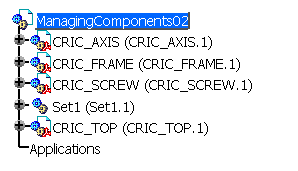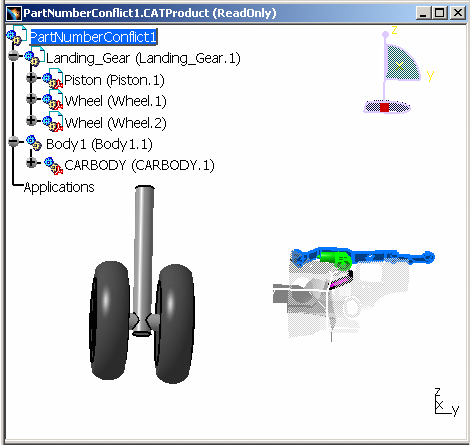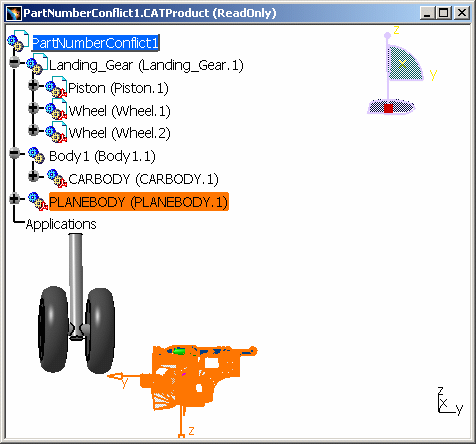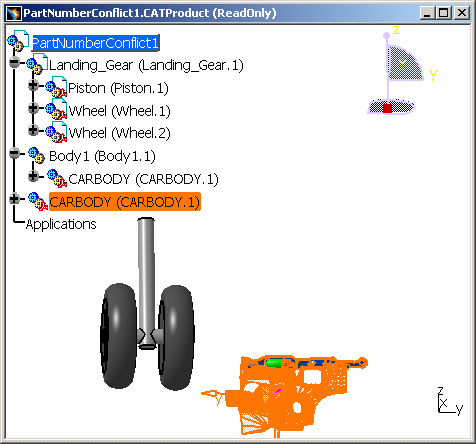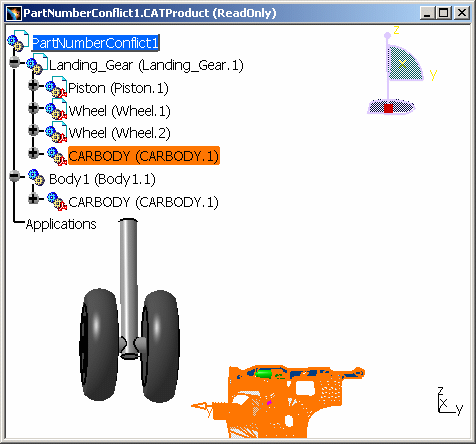 |
This task shows you how to import one or more components into an
existing assembly and
how to:
|
 |
- If you insert a read-only document (a Part for instance) in a
product, the read-only flag of this new document is only valid during
the current session.
- If you save this product, close it and reopen it, the read-only
information on this Part is not maintained.
|
 |
Open the
ManagingComponents02.CATProduct document. |
 |
-
In the Specification Tree, select ManagingComponents02
and click the Existing Component  icon. The Insert an Existing Component dialog box
is displayed.
icon. The Insert an Existing Component dialog box
is displayed.
-
Select CRIC_TOP.CATPart from the
C:\Program Files\Dassault Systemes\B04doc\online\pstug\samples
directory and
click Open.
The CRIC_TOP (CRIC_TOP.1) is created in
the Specification Tree and the Part is displayed in the Geometry area.
|
 |
Depending on the CATIA license you have, you can insert
components (with or without Representation) in a CATProduct:
-
CATPart (*.CATPart),
-
CATProduct (*.CATProduct),
-
V4 CATIA Assembly (*.asm),
-
CATAnalysis (*.CATAnalysis),
|
|
|
| |
Moreover, under a cgr file, you
can insert a component (with or without Representation) such as Product,
Part, Component, Model, cgr. For this, you need to right-click the cgr
file and select Components > New Component / Product /
Part or Components > Existing Components... |
 |
If the Part, Product, model or
cgr you insert into an assembly has the same Part Number as the one
contained in the assembly, the Part Number conflict dialog box
appears. For more
information about inserting and saving a component with the same name as
another one, please refer to these Infrastructure User's Guide chapters:
-
Document: in a file-based environment, a document is identified by
its name and an internal identifier.
-
Saving Existing Documents: if both files have the same UUID (Unique
Universal IDentifier), and if one of them is already open, you will not
be able to open the other.
|
 |
If you see this warning when
inserting an existing document in an assembly:
This means that the current settings, "Linked Document Localization" in
Tools > Options > General > Document, cannot allow the
insertion of this document.
To make the insertion of the existing document possible, please modify
these Document Location parameters (in Tools > Options > General
> Document: Linked Document Localization) so that the next opening
of the assembly effectively allows to find back the inserted document.
 |
For more information about these settings, please
refer to Customizing > Customizing Settings > General >
Document:
Linked Document Localization in the CATIA - Infrastructure User's
Guide. |
|
|
Part Number Conflicts When Inserting a Model
-
Open
PartNumberConflict1.CATProduct.
-
Insert CARBODY.model
into PartNumberConflict.CATProduct. The following dialog box is
displayed:
There is a Part Number conflict because the new component
you insert will be in the same document as CARBODY.model (since the
component Body1 is not a document). CARBODY.model is directly under
PartNumberConflict1.CATProduct.
This Part number conflicts window provides information
about:
- the Part number generating the conflict: CARBODY
- the path of the document generating the name conflict: C:\TEMP\CARBODY.model
- the path of the selected source: C:\TEMP\CARBODY.model
- the Source already existing inside the root product: E:\www\PstEnglish\pstug.doc\src\samples\PartNumberConflict1.CATProduct
You have three solutions:
- Rename...: click the Rename button and the
following dialog box is displayed. You can enter a new Part Number.
Click OK.
Click OK. In the Specification Tree, you can
see PLANEBODY.model under PartNumberConflict.CATProduct:
With this Rename option, you create a new reference of
CARBODY.model with another Part Number.
- Reconnect... : click the Reconnect button to
reconnect the two entities of CARBODY.model.
Both entities (CARBODY.model) are overlapping in the geometry space.
As a consequence, there is only one instance of CARBODY.model in the
Basic View window.
- Automatic rename... : click the Automatic Rename
button to have the Part Number changed into CARBODY.1.model.
|
 |
For our second example, close
PartNumberConflict1.CATProduct without saving. |
|
-
Reopen it.
-
Insert CARBODY.model
into Landing_Gear.CATProduct. There is no Part Number conflict because
CARBODY's reference is different from the one of CARBODY in Body1. A
new local reference has been created.
|
 |
For our third example, close
PartNumberConflict1.CATProduct without saving. |
|
-
Reopen it.
-
Insert CARBODY.model
into Body1.CATProduct. There is a Part Number conflict because there is
the same Part Number within the same document Body1.
|
|
 |
| |
 |
|
Part Number Conflicts When Inserting a Part
|
|
-
Open
PartNumberConflict1.CATProduct.
-
Insert
Landing_Gear_Piston1.CATPart into PartNumberConflict.CATProduct.
The following dialog box is displayed:
 |
| The conflict is due to the presence of the same
Part Number (Piston) in Piston and Landing_Gear_Piston1. You can
Rename (or use the Automatic Rename option) the new instance
Landing_Gear_Piston1. You have the same conflict if you insert
Landing_Gear_Piston1.CATPart into PartNumberConflict1 or in Body1. |
|
 |
If you want to insert the
exact copy of this Part, Piston, the following window will be displayed:
You are not allowed to open the same Part in the same document. |
 |
For more information, another
functionality is available in the Assembly workbench: Inserting an
Existing Components with Positioning, in the CATIA - Assembly User's
Guide. |
 |
 Insert
Existing Component or Part Version from ENOVIA V5 Insert
Existing Component or Part Version from ENOVIA V5
|
| |
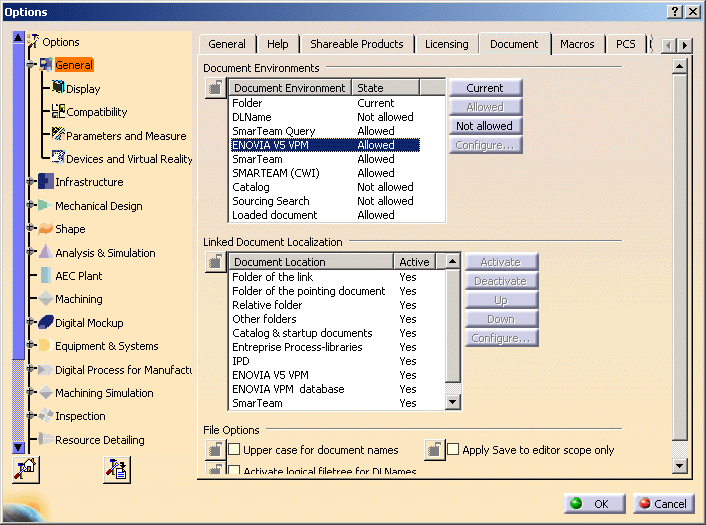
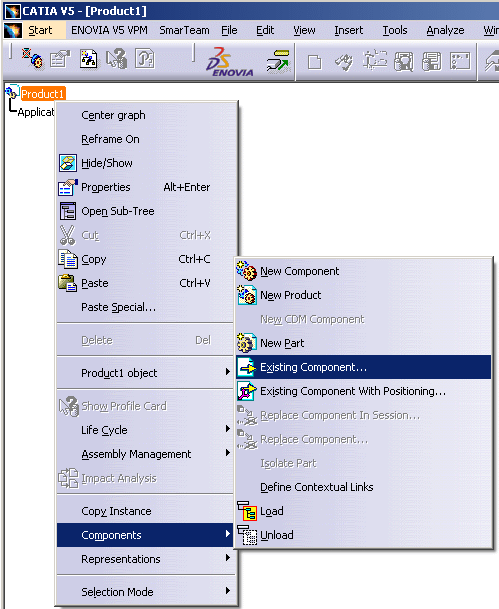
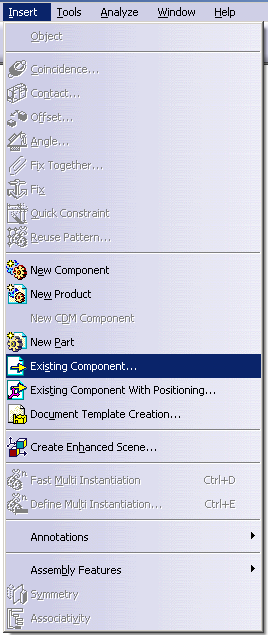
-
File Selection dialog is
displayed. There is no modification of the previous behavior of the command.
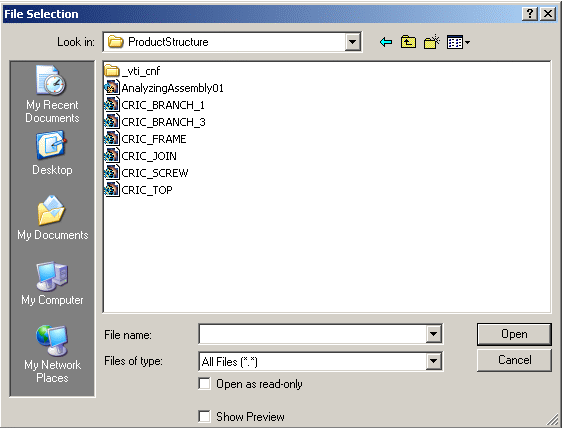
-
-
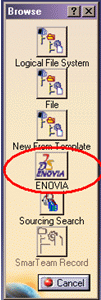
VPM Navigator dialog appears to allow you run a query and
select the document revision or a part version to
insert.
|
| |
-
Open.
The document type is checked and an error message is displayed if the
document type is not a CATPart or a CATProduct.
|
| |
Limitations
-
-
-
|
|

|
